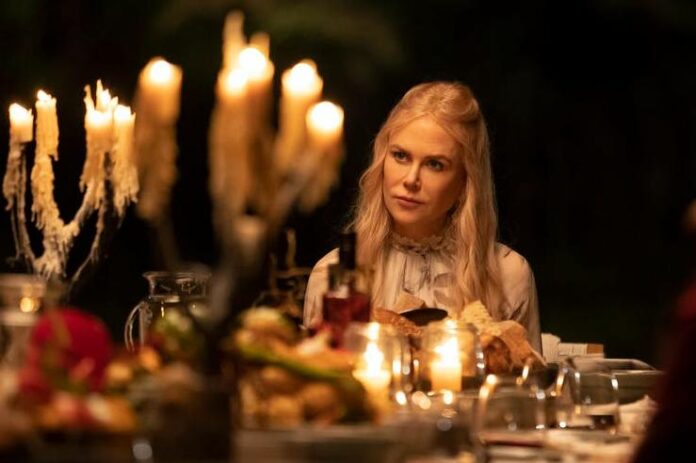Source: University of Canterbury
18 August 2021
This review contains minor spoilers for the first six episodes of Nine Perfect Strangers. Nine Perfect Strangers is a polished take on wellness culture that is less “eat the rich” than “pass the Kool-Aid”. Adapted from Liane Moriarty’s bestselling 2018 novel, it takes place at a secretive, high-end wellness retreat called Tranquillum, an on-trend Scandi dream of bare light wood and open spaces overseen by a mysterious Russian woman, Masha (Nicole Kidman).
-
Masha: Galadriel by way of Gwyneth Paltrow. Amazon Prime
Nine people — a grieving family, a couple on the rocks, and four individuals in crisis — have signed up for a ten-day plunge into self-actualisation. As Masha and the staff gleefully tell one another, the group is volatile. By halfway through the season, bets are on as to who is going to completely lose it, and how much damage they are going to do.
As the dreamy, psychedelic title sequence suggests, Masha’s version of therapeutic practice may be a little less conventional than the guests have anticipated. Tranquillum’s invasive techniques are barely masked by the soft voices and benign smiles of the staff. Behind the scenes, conflicts are getting out of hand.
Masha’s background is also murky. She brings the same ruthlessness to her role as wellness guru as she did her prior life as a CEO, before a life altering experience took her from boardroom to yoga studio.
As she ups her surveillance of the guests and her idiosyncratic therapeutic “protocols”, her motivations and sense of ethics are opaque. We know there has been tragedy at the retreat before, but for her, the promise of nine cathartic breakthroughs – nine changed lives – justifies the ethically dubious and probably illegal means.
She’s also being threatened; Tranquillum is not so safe.
Suspense, and dramedy
As in producer David E. Kelley’s other collaborations with Kidman, Big Little Lies (2017-19) and The Undoing (2020), the camera frequently lingers on Kidman’s uncanny face, emphasising moments of emotional intensity. She’s intense and willowy, Galadriel by way of Gwyneth Paltrow. It is nearly impossible to trust or read her.
These narrative lines provide a sense of mounting suspense, but the series’ mysteries are really window dressing. They are ultimately secondary to a very traditional character dramedy that wants to have things both ways.
Nine Perfect Strangers opens with overt suspicion of the commodification of wellness, present in both the (well-founded!) concerns of the characters and the framing of the retreat itself. Tranquillum offers the sort of bougie, self-indulgent therapeutic experience only the navel-gazing, super-rich can buy.
But this initial satirical impulse is just a hook; there’s little critique present. Instead, as the show progresses, each desperate character embraces the process and addresses their damage.
There’s an uncomfortable sense that the over-priced, therapeutic model which distils trauma into bon mots, timetabling catharsis and manipulating its subjects, might not be a bad thing.
The show’s aesthetic heightens as the doors of perception open. Director Jonathan Levine offers luscious close-up sequences of fruit being macerated and blitzed for daily smoothies, capturing a dual sense of sensuality and latent threat. Images start to distort, colours intensify, and the camera roams woozily. Editing ably charts emerging alliances, catching fleeting glances and moments of candour.
Although the show is set in the US, the Australian location — which is rich with bamboo, bird of paradise flowers and banyan trees — gives a sense we are somewhere outside of the “real” world.
Stellar performances
The dialogue is clever and often funny – eminently quotable. As relationships develop, and the retreat intensifies, the exceptional ensemble cast shines. The guests, who have been carefully selected by Masha, are there to heal each other as well.
They share pointed intimate conversations while lazing on pool toys or sitting in swinging bowers surrounded by outdoor lamps. Each performer balances groundedness and vulnerability, even as their characters loosen their grip on reality.
The show cares about its characters (mostly), even as it puts them through the wringer, although it’s hard to feel sorry for a lottery winner whose wealth has led to existential boredom (Melvin Gregg).
Bestselling author Frances (Melissa McCarthy) is a bundle of shame and self-recrimination who strikes up an alliance with Tony (Bobby Cannavale), an abrasive burnout.
Grieving mother Heather (Asher Keddie) swings from depression to dreamy elation, as her husband Napoleon (Michael Shannon) loses grip of his happy-go-lucky exterior and succumbs to his pain. Their daughter Zoe (Grace Van Patten) celebrates her 21st birthday, supported by the guests but haunted by the death of her twin brother.
Lars (Luke Evans) is a prickly control freak with a hidden agenda. Samara Weaving gives a particularly beautiful, brittle performance as a sweet rich girl whose Instagram-perfect exterior hides extreme distress. Carmel (Regina Hall) is a woman on the edge, straying very close to a “crazy black woman” trope.
‘Maybe I’m hollow’
As Lars announces, “so much self-loathing, so little time”. But does the “nudge, nudge” self-awareness of the show make up for its conventional, reductive view of trauma?
Frances confesses her best-selling novels are gimmicky: they’re “shallow takes on whatever the flavour of the moment is, and I shove some romance into it – they’re hollow”, finishing with “maybe I’m hollow”.
After one of Masha’s speeches, another character asks “what did that mean? It sounded like it had meaning”.
In contrast to the excoriating satirical take on wealth and boredom present in television series The White Lotus, it’s hard not to see such comments as a get out of jail free card.
Nine Perfect Strangers is well-shot, entertaining and more than a little pulpy, but if you’re searching for enlightenment then it would pay to look elsewhere..
This article was originally published on The Conversation.



